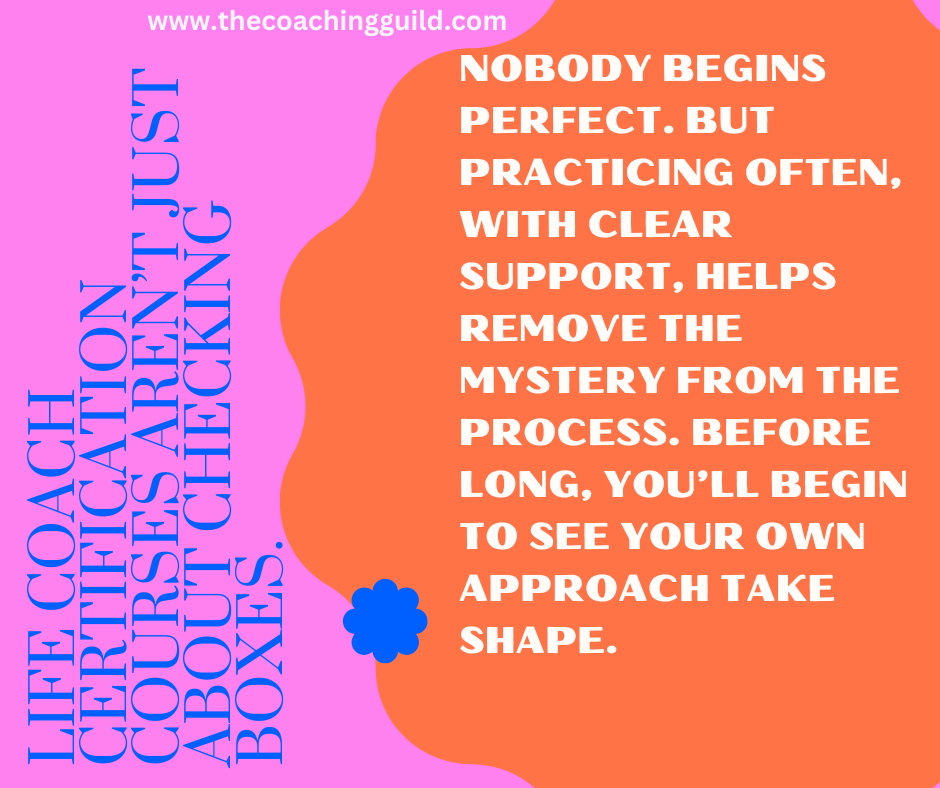The More Instructors the Better
Points of perspective matter - and one point of perspective is not enough.
A lot of coach training programs are built on the knowledge base or theories of one coach.
One expert programs often leave students lacking core and diverse skills. No one is an expert on everything.
Those programs also tend to breed guru communities with dynamics that put the instructor on a pedestal and create unhealthy dynamics in the group. The Coaching Guild was designed intentionally to ensure our students learn in an environment that a diverse experts teaching what they love.
A multiple instructor approach to coach training is superior to a one expert instructor approach for a number of reasons.
- Diversity of perspectives: With multiple instructors, trainees are exposed to a variety of perspectives, teaching styles, and approaches to coaching. This allows them to gain a more well-rounded understanding of the field and develop their own unique coaching style.
- More personalized learning: A multiple instructor approach allows for more personalized learning as trainees have the opportunity to work with multiple coaches. They each bring their own expertise and experience. This can be profoundly helpful for those who may have specific areas of interest or areas they would like to focus on.
- Greater access to resources: With multiple instructors, there is a greater pool of resources and expertise to draw upon. This can be really important for coaches who may have questions or need additional support.
- Networking matters: A multiple instructor approach also provides an opportunity for trainees to network with multiple coaches and build relationships that can be valuable in their career for years to come.
- Increased accountability: A multiple instructor approach can also increase accountability for trainees as they are being evaluated by multiple coaches rather than just one. It is especially helpful in ensuring that our students are meeting the necessary standards and are on track to become successful coaches.
Maybe even more importantly, the rare opportunity to learn from someone who is passionate about the subjects they teach can be transformational for a number of reasons.
- Natural engagement: Passionate teachers are often more engaging, which can make the learning experience more fun. This keeps students motivated and interested in what they are learning.
- Greater enthusiasm: When a teacher is passionate about the subjects they teach, they are often more enthusiastic about sharing their knowledge and experience with their students. That joy is contagious. It helps to spark creativity and curiosity.
- Increased knowledge retention: Passionate teachers are more effective at communicating on their subject matter. Students are more likely to understand and retain the info. Students who learn in this environment are more likely to take the information they are learning and be able to apply it in real-world situations.
- Greater enthusiasm: Finally, passionate teachers are often more enthusiastic about helping their students succeed and are more likely to go the extra mile to ensure that their students understand the material at a deeper level without complicating the topic. Experts are able to communicate complex info with simplicity making it much easier to learn with enthusiasm.
Overall, learning from someone who is passionate about the subjects they teach can greatly enhance the learning experience and lead to better knowledge retention and success for students. The Coaching Guild is dedicated to providing our students with the best experts on the market. Because of that our dynamic learning experience is always growing and expanding with our experts.
The Coaching Guild offers a comprehensive coach training program to help individuals become certified coaches.
Our program is designed to teach the skills and knowledge necessary to succeed in the coaching industry. We cover a wide range of topics, including brain science, behavioral science, identity shifting, science based deliberate creation, and more. Additionally, our we teach organic sales and marketing skills every step of the way so our students have the tools they need to succeed. We believe that with the right training, anyone can become a successful coach. Join The Coaching Guild and start your journey to becoming a certified coach today.


